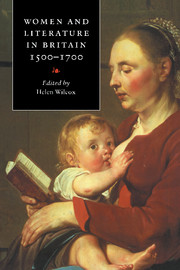Introduction
Published online by Cambridge University Press: 22 September 2009
Summary
But when some of those thoughts are sent out in words, they give the rest more liberty to place themselves in a more methodical order: marching more regularly with my pen on the ground of white paper. But my letters seem rather as a ragged rout than a well armed body. For the brain being quicker in creating than the hand in writing or the memory in retaining, many fancies are lost, by reason they oft-times outrun the pen. Where I, to keep speed in the race, write so fast as I stay not so long to write my letters plain: insomuch as some have taken my handwriting for some strange character.
(Margaret Cavendish, Duchess of Newcastle, ‘A True Relation of my Birth, Breeding and Life’)Margaret Cavendish's account of the exhilarating process of writing, taken from her autobiography published in 1656, seems an appropriate passage with which to begin our consideration of women and literature in Britain in the sixteenth and seventeenth centuries. For her words express many of the paradoxes associated with women, writing and early modern history. Cavendish, literate and relatively leisured, was bursting with creative energy, as is suggested in her description of the quickness (literally, ‘aliveness’ as well as speed) of the brain, the impression of her thoughts queuing up to be ‘sent out in words’, and the image of the tumbling ‘ragged rout’ of letters on the page.
- Type
- Chapter
- Information
- Women and Literature in Britain, 1500–1700 , pp. 1 - 6Publisher: Cambridge University PressPrint publication year: 1996
- 1
- Cited by



